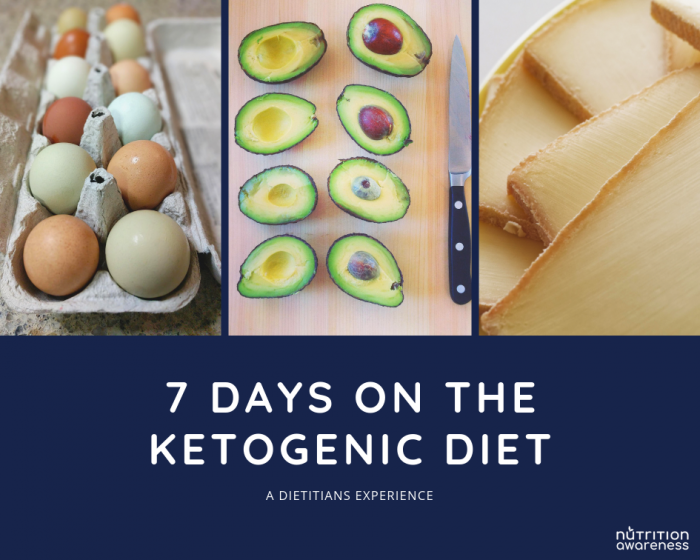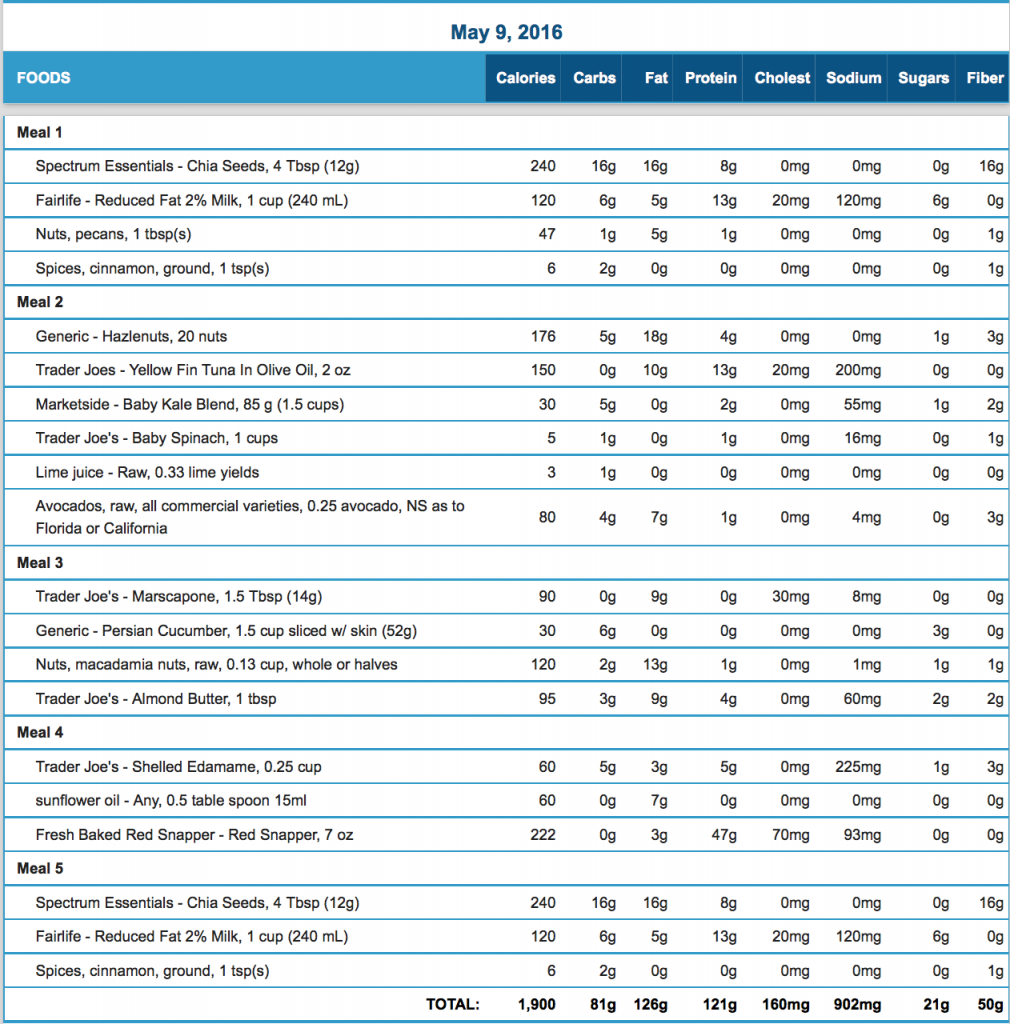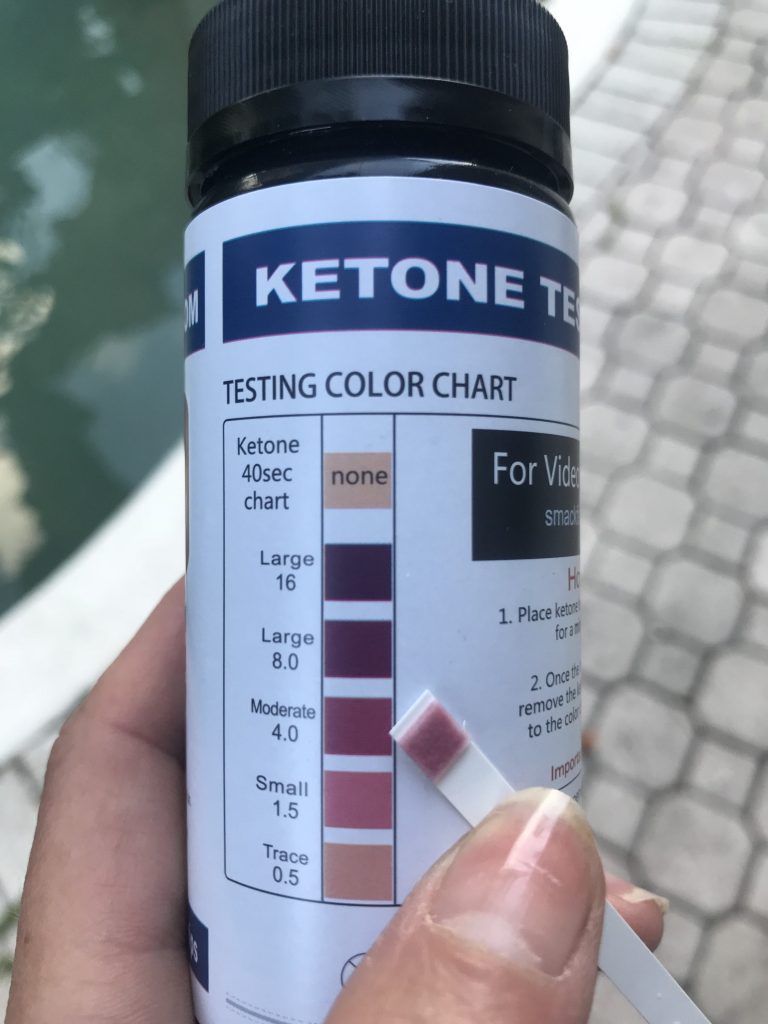
The ketogenic diet is essentially the Atkins diet of the 2010s. Super popular, almost impossible to maintain long-term, and wildly effective for weight loss (per anecdotal reports as well as scientific research).
What is the ketogenic diet? Your goal on a “keto” diet is to get at least 70% of calories from fat, no more than 25% of calories from protein and only 5-10% from carbohydrate. For most people, that means restricting your carb intake to below 50 grams a day. The ketogenic diet started as a treatment for children with uncontrolled epilepsy (seizures). The body and brain are forced to get energy from fat instead of carbs. The body then produces ketones that fuel our cells (instead of glucose). Reports as far back as the 1920’s show that when epileptic children switched to a strict all-fat diet, they had less seizures.
If their brains could benefit from running off of ketones, could yours too? Researchers since the 1960’s have been studying the ketogenic diet, showing its effectiveness for weight loss and improved insulin resistance. Emerging data also suggests a neurological benefits and decreased cancer risks. Please note, I’m saying evidence exists. That doesn’t mean the verdict is in and that does NOT mean that the ketogenic diet won’t have negative effects elsewhere.
What do you eat? It’s easier to start with what you DON’T eat. No bread, fruit, starchy vegetables (like potatoes or corn), cookies, candy, ice cream, pizza, sandwiches, rice, quinoa, cereal, oatmeal, waffles, smoothies, beer, protein bars… basically, most food is off limits.
That leaves us with full fat dairy (cheese, plain yogurt, butter), greens like spinach and kale, nuts and seeds, nut butters, oils, coconut, cacao, avocado and small portions of fatty fish, beef, and eggs.
Some people hear this and think YES! I can eat all of the bacon and butter I want to. First off, those aren’t the types of fat to focus on. I, on the other hand, was not excited to try this. Some of my favorite foods are fruits and grains. Oh yeah, and I’m kind of lactose intolerant.
So why would I try this? I was completely dismissive of the ketogenic diet at first. Putting butter in coffee is going to help my clients lose weight? After I’ve been telling them how important it is to have a balance of protein, fat and carbs at regular intervals? My way works– why would I want anyone to try this extreme diet?
After a few years, I finally gave in to listening to a few lectures from Dr. Jeff Volek, a dietitian and researcher at Ohio State, the expert of experts on ketogenic diets. Despite the sense he was making, I quickly dismissed everything he was saying. I can’t eat that way for a prolonged period of time and neither can my clients, so what’s the point?
Then, I heard a podcast from Tim Ferriss with Dom D’agostino, another popular keto researcher. I read about high level athletes utilizing the ketogenic diet who claimed to be performing at the top of their game. I read about people who are keto-adapted that swear they have a mental clarity they never felt while eating carbs and energy levels through the roof. Maybe it was doable after all…
My experience: I woke up one morning and just told myself that today was the day. Make it through one day without carbs and see what happens. Without much prep time in the way of grocery shopping or meal planning (which I would not suggest), I had no idea what to eat for breakfast. My usual sprouted grain toast with almond butter and mango was out the window.
I threw together some “fat-balls” with random pantry staples: almond flour, natural peanut butter (only ingredient: peanuts), melted coconut oil, shaved unsweetened coconut, and chia seeds. Think balls of cookie dough with no sweetness. I got through a strength-training workout just fine on a few of those. I had about 3 hard boiled eggs throughout the day then a large salad with greens drenched in olive oil and avocado, a piece of mahi mahi and some olives for dinner. The toughest parts of day 1 were saying no to Italian ice on the way home from the beach and wanting to eat an apple after dinner. Other than that, no big deal.
The weirdest thing happened when I woke up on Day 2. I had abs. Abs like I’ve never seen on myself. It was like the layer of fat that had been hiding the muscle had been stripped away overnight.
Being a dietitian, I know how ridiculous this sounds. I couldn’t help thinking of all of the years I’d been busting my ass in the gym to just turn around and see abs from not eating carbs for one day. Now, it wasn’t magic… there’s a scientific reason why I all of a sudden looked toned. The body retains water when you eat carbs, which isn’t necessarily a bad thing. Glycogen is the storage from of glucose, what your body uses as fuel when you eat carbohydrate. Every gram of glycogen in your body is bound to 3-4 grams of water. Since I didn’t give my body any carbohydrate for energy the day before, I burned through my glycogen stores and the water attached to them as well.
I did not actually get rid of any fat on my body. If I were to eat a high carb meal, the water weight would quickly return.
Day 2 was really rough. My brain was not working. I left my phone in the refrigerator. I had a hard time coming up with the right words I wanted to say. I worked out late and was unable to maintain my previous week’s PRs. Despite not eating any carbohydrate-rich foods, my intake still ended at over 50 grams from “incidental” carbs from foods like edamame, chia seeds and milk.

Day 3 was a completely different ball game– a world of difference from the day before. I was in a great mood and felt high in energy even at 8pm (I’m usually over everything by 7pm). I ate a meal at around 7am then not again until 2:30pm. I would normally never go that long without eating without having a major freakout. But, I never got hangry. I had great workout and especially felt good after 3 scoops of my go-to BCAAs (read more about BCAAs here). I felt like I was over the hump! I looked fitter than ever and I could visibly see more definition and muscle tone. If I felt like this all the time, maybe I really “do keto.”

Day 4 Nope, I can’t do this. I couldn’t even get out of bed in the morning. I felt hungover. I was not hungry at all and I had no desire to eat. I finally did eat at about 9am (about 4 hours after I got up- not like me at all). I was craving fruit, but made an omelet with avocado and cheese. I ate half of it and didn’t want the rest. I was really sick of the repetitive foods, the soft textures and all of the oil. I felt like my body was starting to reject what I was giving it. All I wanted to do was sleep, I had no motivation, was absent-minded and my muscles were overly sore. I did a urinalysis and tested positive for ketones.
Day 5 Bullet-proof coffee to the rescue? I made a cup of french-press and blended it with grass-fed butter. I guess it worked. I felt fine and ended up fasting for 15 hours. I now understand why intermittent fasting and the ketogenic diet go so well together: you’re not hungry and there’s really nothing you want to eat. My go to was full fat greek yogurt with almond butter stirred in and unsweetened cacao. I started getting muscle twitches in my right shoulder and back. Have you ever had an uncontrollable, never-ending eye twitch? It was like that.
Day 6 Restless sleep. Moody. Really struggling. There is nothing that I want to eat that doesn’t turn my stomach to think about. I had no energy to work out and I was still sore from my day 4 workout, which was in no way normal.
It was my boyfriends birthday. I picked up his favorite dessert– a key lime cheesecake, which I, of course, couldn’t have. I took him to dinner at a place I knew he had been wanting to try. It was the type of place that changes their menu daily and doesn’t appreciate people asking for substitutions. There wasn’t an entree on the menu that I could have that didn’t make me feel sick to think about so we ended up sharing a charcuterie and cheese board. I hated it. He hated it. I wanted no part of meat or cheese or nuts any more. Food is a big part of our relationship– we love trying new foods, new places, and cooking for each other. All of that would have to go if this was going to be something I continued. He asked if we could not go out to eat again unless I knew for sure there was something that I could eat on the menu that I actually wanted. All I wanted was a damn mango.
Day 7 My ketone strip showed a trace amount. So frustrating! I ruined a birthday dinner for nothing. One glass of wine knocked me out of ketosis? I decided to fast until the afternoon until I was testing higher. It’s not like I wanted to eat anyway. That’s the weirdest part of this experience– feeling no hunger, no desire to eat. I guess it’s convenient because you spend less time preparing food or going to get food.
I was in a horrible mood and it was effecting my interactions with clients. I had a fun weekend planned: tickets to 2 different shows and a beach trip. I started to re-evaluate. I felt like crap, my body was sore and tired, I was less active and my work and relationship were both suffering. My brain was sluggish. I couldn’t imagine getting though the weekend in the mood I was in. I was really feeling some of the negative effects of starting a ketogenic diet, which can widely differ from person to person.
I reached out to some hardcore keto-ers:
“You’re just experiencing keto-flu. Up your sodium intake with some broth and it’ll pass in a few days.”
“The first week isn’t pretty, especially in the gym. It has a big impact on energy levels once you get going though. Worth it!”
“Stick with it. It takes the body weeks to adapt.”
Despite their encouragement, I gave up. I gave up hard. A mango, a slice of the cheesecake I missed out on earlier in the week, a glass of wine, a beer, and nachos. My mood immediately improved. Eating foods with texture and crunch again was like a gift from heaven.
I enjoyed my weekend as normal then headed to the 3-day Today’s Dietitian Symposium. They provided breakfast and lunch for the conference and I realized that if I was still doing keto, there was literally nothing I could eat that they offered. Breakfast was flavored yogurt with bagels, fruit and muffins (great choices for a conference for dietitians, right?). I guess I could eat the cream cheese with a spoon? Lunch was a wrap stuffed with couscous, a side of pasta salad, an apple and a bar. There was a small market in the hotel with bananas and pastries, but nothing I could have eaten there either. The expo room did have some walnuts. I definitely felt “fluffy” from all the carbs and have gone back to being hungry every few hours.
From my experience, the ketogenic diet is not something you can realistically stick with if you enjoy food. If you like traveling and trying new things, going to restaurants, celebrating a friends birthday with cake, those things are out the window. You would have to plan every meal ahead and take food with you. You can’t rely on grabbing a quick bar or a banana. Like every other diet out there, you can do it for a few days or weeks until you fall off the wagon when you realize you can’t do it forever.
If food isn’t a priority for you or you have a propensity towards higher fat foods, you could make the ketogenic diet work. It may be worth it, but for me right now… I just couldn’t do it. I am bummed that I wasn’t able to make it a few weeks and see if there was a difference in energy levels and focus but on that last day when I tried to force myself to eat my salad drenched in oil, cheese, and beef, I literally had to spit it out. That was the last straw for me. Keto was making me a crazy person.
Would I try it again? Maybe… with exogenous ketones (apparently they help you to get over the “keto-flu”). But then I think: “never have fruit again? Never have cheesecake again?” Never mind. I’ll go back to my healthy, balanced diet. It’s got me this far.
UDPATE (7/25/16): I did try again. I thought maybe with a little experience under my belt and some MCT oil powder, I could conquer keto for more than a week. The big push was that my boyfriend wanted to see how keto affected him as well. Since he is a lot more inclined to eat fatty foods, he thought it would be pretty easy and agreed to help with cooking.
Well, we made it 10 days. I got my LDL cholesterol tested (which has never been high) and it was 218. Now I know there is debate on what this LDL result really means when you’re following keto and if your risk for heart disease is greater, but that was just another sign that my body did not like what I was doing.
I was tired, unable to work out like I do normally, and each day crawled by. One day felt like four days. I tried sticking to a 2:1:1 fat:carb:protein ratio, but my body clearly did not love eating mostly fat and was not inclined to stay in ketosis. I went to a BBQ and the only thing I could eat was a hot dog with mustard and no bun. Gross. How in the world can this be good for me?
After eating a thai chicken salad (no carbs on it) with minimal dressing and some blueberries, I saw trace ketones on my urine stick. I tried to minimize the damage with MCT oil powder and coffee. Still trace. After that, I was done. If I can’t even eat a few blueberries, my body feels weak and tired, and I’m not even seeing the leanness that I saw the first time, there’s no point in me continuing. My boyfriend couldn’t wait to go back to our more balanced way of eating either– no more oily salad please!
Even the biggest proponents for the ketogenic diet agree that this is not a one-size-fits-all solution for everyone. Each person is an individual and what works for one will not work for all.
One thing that I will continue to do is to make sure I’m getting a good source of healthy fats every time I eat from foods like avocado, nuts, seeds, pasture-raised eggs, and extra virgin olive oil. But, I’m pairing them with a complex carb. My ezekiel toast with avocado and eggs are staying on the menu.
If you need help losing weight, improving your performance or increasing your energy, contact me at megan@orlandodietitian.com or schedule your appointment here.
Not in Orlando but still need some nutrition tips? We also do online or over the phone consultations.
References:
Beyond weight loss: a review of the therapeutic uses of very-low-carbohydrate (ketogenic) diets. European Journal of Clinical Nutrition (2013) 67, 789–796; doi:10.1038/ejcn.2013.116; published online 26 June 2013
Ketogenic Diet for Obesity: Friend or Foe? Int J Environ Res Public Health. 2014 Feb; 11(2): 2092–2107.
Long-term effects of a ketogenic diet in obese patients. Exp Clin Cardiol. 2004 Fall; 9(3): 200–205.
